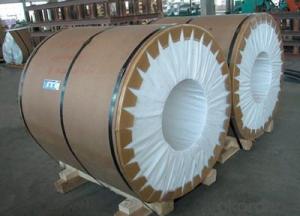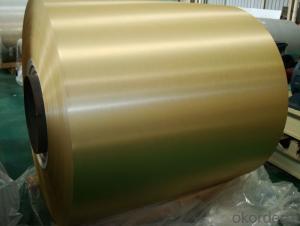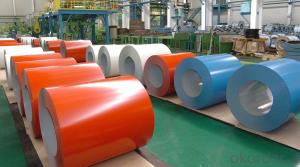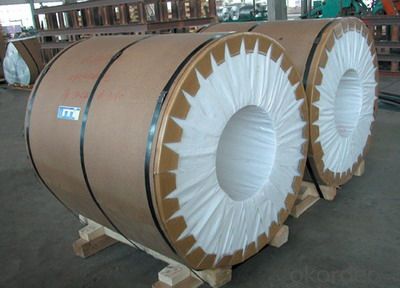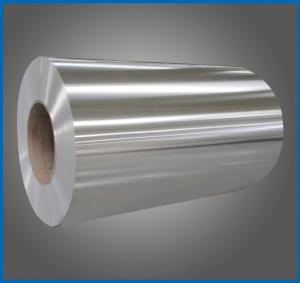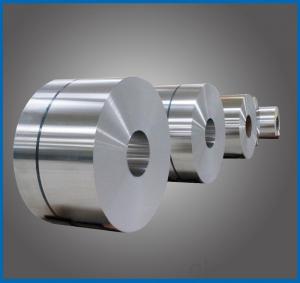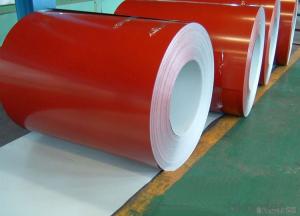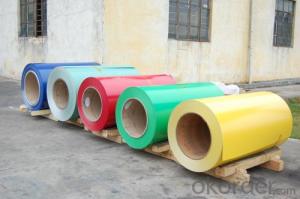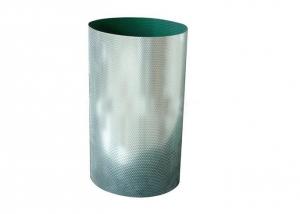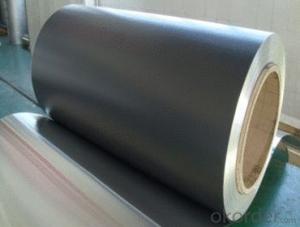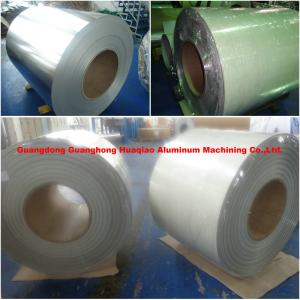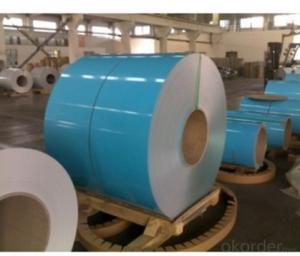China Diamond Embossed Aluminum Coil - Best Quality Prepainted Aluminum Coil Hot Demanded
- Loading Port:
- Shanghai
- Payment Terms:
- TT OR LC
- Min Order Qty:
- 5 m.t.
- Supply Capability:
- 20000 m.t./month
OKorder Service Pledge
OKorder Financial Service
You Might Also Like
Structure of Aluminium Prepainted Coil Best Quality and Hot Demanded Description:
Aluminium Prepainted Coil Best Quality and Hot Demanded are of a wide range of colors, which gives wonderful appearance no matter in residential and commercial constructions of great exhibition centers.
The coated aluminum coil/sheet have been widely used in the fields of construction and decoration( garage doors, ceiling etc.), electronic appliances, lighting decoration, air-condition air pipes, sandwich panels and drainages etc.
Main Features of the Aluminium Prepainted Coil Best Quality and Hot Demanded:
1)High flexibility.
2)Impact resistance.
3)Excellent weather-proof durablity.
4)Anti-ultraviolet.
5)Hight erosion resist.
Images of Aluminium Prepainted Coil Best Quality and Hot Demanded:
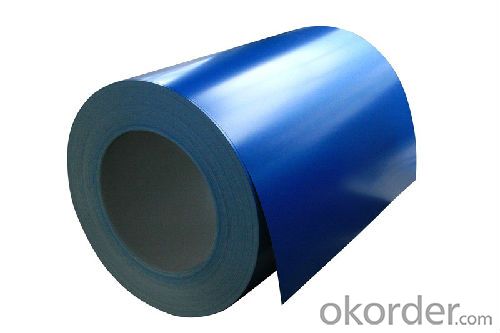
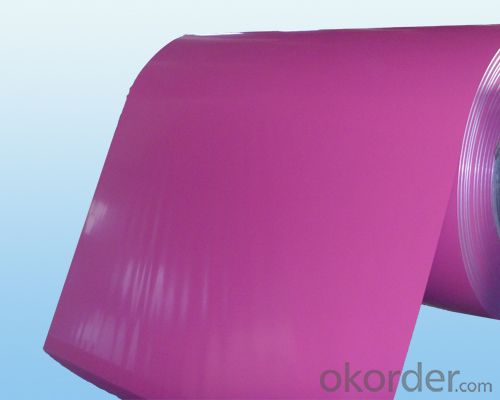
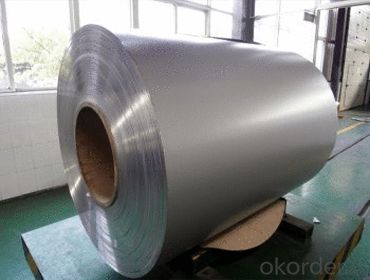
Aluminium Prepainted Coil Best Quality and Hot Demanded Specification:
Alloy | A1100,A3003,A1050,A8011 etc |
Temper | H16,H18,H24 |
Thickness | From 0.024mm to 1.2mm |
Width | Standard width:1240mm |
Special width:1300mm,1520mm,1570mm,1595mm | |
Diameter | Standard dia:1200mm |
Interior dia:150mm,405mm,505mm | |
Weight | 2.5 T/coil,3.0 T/coil |
Coating | PE, PVDF, AC |
Surface | Embossed, mill finish, coated |
Color | AS to code RAL |
Gloss | 10-90%(EN ISO-2813:1994) |
Coating Thickness | PE: more than 18 micron |
PVDF: more than 25 micron | |
Coating Hardness (pencil resistance) | More than 2h |
Coating adhesion | 5J(EN ISO-2409:1994) |
Impact Resistance | No peeling or cracking(50 kg/cm,ASTMD-2794:1993) |
Flexibility (T-bend) | 2T |
MEK resistance | More than 100 |
FAQ:
a.What is monthly capacity
---CNBM is one stated own company and our monthly capacity is about 2000tons.
b. Now which countries do you export your goods?
---Now we export to South East Asia,Africa, North America,South America ect.
- Q: Are aluminum coils suitable for HVAC systems?
- Indeed, HVAC systems can utilize aluminum coils as they prove to be a suitable choice. When compared to conventional copper coils, aluminum coils present numerous advantages. Notably, their heightened resistance to corrosion aids in prolonging the lifespan of the HVAC system. Moreover, aluminum coils possess superior heat transfer properties, facilitating more efficient cooling and heating processes. Additionally, their lighter weight allows for effortless installation and manageable handling during maintenance or repairs. Consequently, aluminum coils emerge as a dependable and cost-effective alternative for HVAC systems.
- Q: What is the formula to calculate the wall thickness of aluminum coil?
- Aluminum coil thickness*aluminum coil width*aluminum coil curl*aluminum density (the density of aluminum alloy: 2.73, the density of pure aluminum: 2.71)
- Q: Its got probably 330 horses right now with aluminum heads what do you think it be approx.
- depends on the heads, what mods have been done to them
- Q: What are the different coil uncoiling options for aluminum coils?
- There are several different coil uncoiling options available for aluminum coils. These options vary based on the specific needs and requirements of the application. One common method is manual uncoiling, where the coil is unwound by hand. This is typically used for smaller coils or in situations where precision and control are important. Manual uncoiling allows for careful handling of the aluminum coil and is often used in smaller scale operations. Another option is mechanical uncoiling, which involves using a machine or equipment to unwind the coil. Mechanical uncoiling is suitable for larger coils or high-volume production. It allows for faster and more efficient uncoiling, reducing the labor involved in the process. Furthermore, there are specialized uncoiling machines available that can handle specific requirements. For instance, some machines are designed for delicate or sensitive materials and offer features like adjustable tension control to prevent any damage to the aluminum coil during uncoiling. In addition to these options, there are also custom uncoiling solutions that can be designed to meet specific needs. These solutions may involve different mechanisms or techniques to ensure the safe and efficient uncoiling of aluminum coils. Ultimately, the choice of coil uncoiling option depends on factors such as the size of the coil, production volume, level of precision required, and any specific needs or constraints of the application.
- Q: How do aluminum coils contribute to indoor air quality?
- Aluminum coils used in heating, ventilation, and air conditioning (HVAC) systems do not directly contribute to indoor air quality. However, they play a crucial role in maintaining indoor air quality by helping to cool and dehumidify the air. By efficiently transferring heat and moisture, aluminum coils aid in controlling temperature and humidity levels, preventing the growth of mold, mildew, and other harmful microorganisms that can negatively impact indoor air quality.
- Q: I have a school project due in a couple weeks and I need to make a life size sculpture of a camera. I don't want to make it solid because that would use a lot of clay and wouldn't evenly cook. Can I put something inside like aluminum foil?
- The aluminum will not allow the clay to shrink as it dries. The clay will crack. Also, the aluminum will melt around 1200* so you need to know how hot you will be firing the kiln. You should be able to make the camera body by the slab method and make a box and add the lens and knobs. This will give you a hollow body.
- Q: What are the potential drawbacks or limitations of using aluminum coils?
- There are several potential drawbacks or limitations associated with using aluminum coils. Firstly, aluminum is a relatively soft metal compared to other coil materials like copper or steel. This softness can make the aluminum coils more vulnerable to damage, such as denting or bending, especially in high-impact environments. Additionally, aluminum is prone to corrosion, particularly in harsh or corrosive environments, which can negatively impact the performance and lifespan of the coils. Another limitation of aluminum coils is their lower thermal conductivity compared to copper coils. This means that aluminum coils may not be as efficient in transferring heat, which can result in decreased cooling or heating performance in certain applications. Additionally, the lower thermal conductivity may lead to higher energy consumption, as the system would need to work harder to achieve the desired temperature. Moreover, when aluminum coils are used in HVAC systems, there can be compatibility issues with certain refrigerants. Aluminum can react with certain refrigerants, causing corrosion or other chemical reactions that may compromise the performance and longevity of the coils. This requires careful consideration and compatibility testing when selecting the refrigerant to be used with aluminum coils. Lastly, the cost of aluminum coils can be higher compared to other coil materials. While aluminum itself is relatively inexpensive, the manufacturing process of aluminum coils can be more complex and costly, which can impact the overall cost of the product. Despite these drawbacks, aluminum coils are still widely used in various industries due to their lightweight nature, good electrical conductivity, and resistance to certain types of corrosion. However, it is essential to carefully assess the specific application, environment, and requirements before selecting aluminum coils to ensure they are the most suitable choice.
- Q: This question asks about potential safety hazards when using electric heaters that have aluminum coils.
- <p>While electric heaters with aluminum coils are generally safe when used properly, there are some safety concerns to consider. Aluminum can heat up quickly and may become very hot, posing a risk of burns if touched. Additionally, aluminum coils can corrode over time, potentially leading to electrical shorts or fires. It's important to ensure that the heater is not covered or obstructed, as this can cause overheating. Always follow the manufacturer's instructions for use and safety precautions. Regularly inspect the heater for any signs of damage or wear, and never use a heater with a damaged cord or plug.</p>
- Q: How are aluminum coils protected from corrosion?
- Aluminum coils are protected from corrosion through various methods, including the application of protective coatings such as paint or anodizing, using corrosion-resistant alloys, and applying a layer of zinc through a process called galvanizing. These protective measures create a barrier between the aluminum surface and external elements, preventing corrosion and extending the lifespan of the coils.
- Q: i dont want aluminum cookware, but how about a stainless steel set with an aluminum core. Is this the same as aluminum pots and pans? Thanks.
- The aluminum is encased in the stainless steel, usually as a thick disk in the bottom. It is an excellent conductor of heat and holds the heat well once it gets hot. All you see is the stainless, none of the aluminum because it's between two layers of stainless in the bottom of the pots. You are right, you don't want food cooked in straight aluminum, some metal taste can transfer to certain foods. That won't happen with stainless.
Send your message to us
China Diamond Embossed Aluminum Coil - Best Quality Prepainted Aluminum Coil Hot Demanded
- Loading Port:
- Shanghai
- Payment Terms:
- TT OR LC
- Min Order Qty:
- 5 m.t.
- Supply Capability:
- 20000 m.t./month
OKorder Service Pledge
OKorder Financial Service
Similar products
Hot products
Hot Searches
Related keywords
